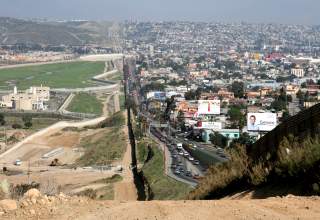Congress’s Lawyers Aren’t Sure Whether the Pentagon Can Build a Border Wall
The Congressional Research Service, Congress’s research arm, says the answer is “yes.” Or, “no.” Or, it depends on what the judge says, according to a report by three CRS legislative attorneys.
The Congressional Research Service, Congress’s research arm, says the answer is “yes.” Or, “no.” Or, it depends on what the judge says, according to a report by three CRS legislative attorneys.
Their analysis focused on whether Trump can legally order the Department of Defense to build a wall along the U.S.-Mexico border. Trump has been stymied by Congressional Democrats who argue that the $5.7 billion project is unnecessary. A frustrated Trump has threatened to declare a national emergency under the National Emergencies Act (NEA), which he believes would allow him to order the wall built as an emergency military construction project under the Military Construction Codification Act (MCCA).
Such an approach was bound to be mired in legal technicalities, and the CRS analysis does not disappoint:
“Because the NEA and related military construction authorities do not appear to have been [previously] employed to construct barriers along the U.S. border, the invocation of such authorities for that purpose would raise a variety of novel legal issues, including (1) the circumstances in which conditions along the border rise to the level of a ‘national emergency’ that ‘requires use of the armed forces,’ and the circumstances in which military construction is ‘necessary to support such use of the armed forces’; (2) the meaning of the term ‘military construction’ in the MCCA; (3) how a court would review different segments of border wall construction; and (4) the relationship between military construction authorities and various other federal laws and constitutional considerations that shape the manner in which federal agencies carry out construction projects.”
CRS points out that in general, the President of the United States has broad powers to declare a national emergency: “By 1973, Congress had enacted over 470 statutes granting the President special authorities upon the declaration of a ‘national emergency,’ but had imposed no substantive or procedural limitations on either the President’s discretion to declare an emergency or the duration of such emergencies.”
Indeed, there are fully twenty-eight national emergencies currently in effect, and some have lasted for decades. The rub seems to be Section 2808 of the Military Construction Codification Act, enacted in 1982 to allow the Secretary of Defense to initiate construction projects to support the armed forces, even if the work has not been authorized by Congress. “Presidents have generally invoked this authority in connection with construction at military bases in foreign countries,” CRS notes.
Trump’s interpretation is novel, to say the least. There are questions about whether the situation on the U.S.-Mexico border is a genuine national emergency, and whether a border wall counts as a military construction project under Title 10 of the U.S. Code, which is the body of laws governing the U.S. military.
Not surprisingly, CRS concludes that ultimately it will be up to a judge to decide whether Trump can get the military to build his wall. Interestingly, CRS raises the possibility that the court could rule that the wall is legal along some areas of the border, but not others. “It is possible, for example, that securing certain areas of the border is more likely to ‘require use of the armed forces’ than securing other areas, and that a border wall may be ‘necessary to support such use of the armed forces’ at some locations but not others.”
The real question is this: the U.S. military is fighting a war in Afghanistan and a semi-war in Syria and Iraq, and trying to reorient its strategy and equipment from counterinsurgency operations to high-tech warfare against advanced Russian and Chinese forces. Aren’t there better uses for Pentagon funds, such as fixing the F-35 fighter or easing the burden on overworked troops and ships? Aren’t there other agencies, notably the Department of Homeland Security and its Customs and Border Patrol arm, that have the authority, personnel and mission to guard the border?
Unless you believe that the Mexican Army is about to invade the U.S. and unleash a flood of illegal aliens, Trump’s notion that border security is a military responsibility is dubious at best.
Michael Peck is a contributing writer for the National Interest. He can be found on Twitter and Facebook.
Image: Wikimedia

